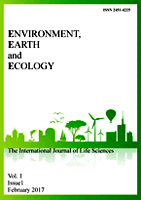ORIGINAL PAPER
Effects of Climate Change on Rice Production at Khulna district, Bangladesh.
| 1 |
Faculty of Urban Construction and Environmental Engineering, Chongqing University, Chongqing, 400045, China |
| 2 |
Department of Environmental Science and Resource Management, Mawlana Bhashani Science and Technology University, Santosh, Tangail-1902, Bangladesh |
| 3 |
Bangladesh Meteorological Department, Ministry of Defense, Dhaka-1207, Bangladesh |
| 4 |
Institute of Water and Flood Management (IWFM), Bangladesh University of Engineering and Technology (BUET), Bangladesh |
| 5 |
Climate Change and Protected Area Management Officer, USAID’s Climate Resilient Ecosystems and Livelihoods, South-West Region, Khulna, Bangladesh |
Environ. Earth Ecol. 2019;3(1):42-54
KEYWORDS
TOPICS
ABSTRACT
In Bangladesh 164 million people depend on rice but due to climate change (CC) vulnerabilities the yield of rice is severely reducing. Therefore, this study aimed to explore the effects of CC on rice yield using recent trend analysis, Mann-Kendall (MK) trend test and correlation. For this study, the required climate and selected rice production data were collected from Bangladesh Meteorological Department (BMD) and Department of Agriculture Extension (DAE), Khulna. In time series statistics both parametric and nonparametric methods were applied to detect a monotonic trend of climatic variability and Aman rice production. Correlation between climatic variability and rice production was also investigated. The study exposed that the temperature and rainfall had an increasing trend and statistically significant whereas the relative humidity found decreasing. Overall, the bright Sunshine had positive trend but week. According to non-parametric trend test of climatic variability and Aman yield only minimum temperature showed a positive trend which found statistically significant. In contrast, Mann-Kendall trend test revealed that rainfall had positively significant while temperature had negative significant. The correlation revealed the Aman production is a strong response with minimum temperature whereas the Lona Coche showed a positive correlation with maximum temperature. The variation of Aman production exhibited a positive correlation with both Rainfall and humidity respectively and Lona Coche found a negative correlation. The sunshine had a week correlation against both yields. The findings suggest should give attention of temperature-tolerant rice varieties to mitigate possible adverse effects of CC.
Corresponding author
Nuralam Hossain 
Campus A, Chongqing University, Shapingba, Chongqing 400045, China







